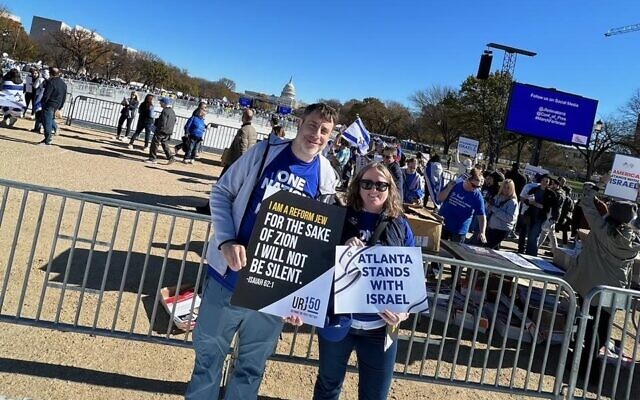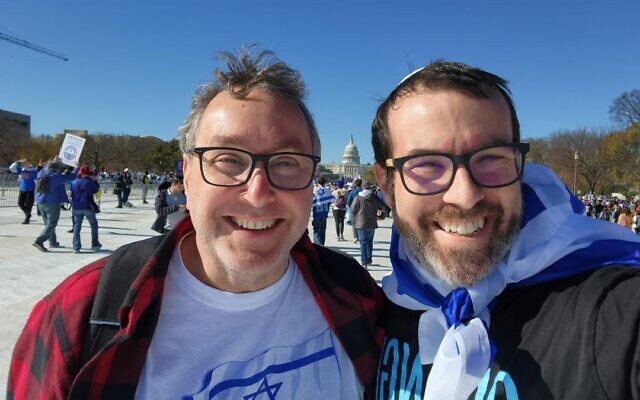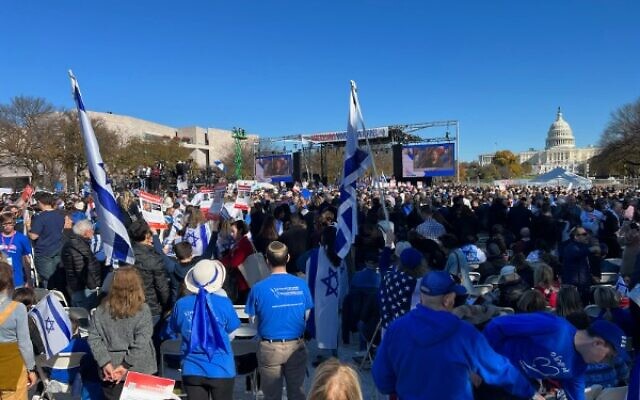March for Israel Inspired Atlanta Participants
Hundreds traveled to Washington to join almost 300,000 other rally attendees.
Ana Robbins, founder and executive director of Jewish Kids Group, posted a photo of the crowd attending the Nov. 14 “March for Israel” rally on Facebook and quipped, “I love going to the mall with friends.”
According to Robbins – who is married to Eric Robbins, president and CEO of the Jewish Federation of Greater Atlanta – approximately 700 Atlantans traveled to Washington, D.C., for the rally organized by the Jewish Federations of North America and the Conference of Presidents of Major American Jewish Organizations.
Organizers estimated that the crowd at the National Mall numbered just under 300,000, making it one of the largest Jewish rallies in American history.
Atlantans who added to those numbers seemed overwhelmingly inspired by their presence. “When I heard that there was a rally in Washington to stand with Israel, to call for a speedy return of the hostages, and to end the rampant antisemitism in America, there was no place else to be,” said Rabbi Peter Berg of The Temple.
“I’m proud of and inspired by the countless Temple members who booked flights to all be together on the National Mall. It was truly a moment of Klal Yisrael, of Jewish unity,” said Berg. “I’m especially grateful to the leadership of both parties in Congress who held hands while chanting ‘bring them home’. It was important for the world to see so many people calling out Hamas terrorists. I will not stop going to Washington in the coming weeks to make sure my voice is heard loud and clear.”
The rally resulted from the desire of American Jews to express their concern, and support, for Israel in the wake of the deadly attack by Hamas terrorists on Oct. 7. Israel estimates that 1,200 people were killed not far from the Gaza border, with thousands more injured, about 240 abducted as hostages into Gaza and dozens still missing and whose bodies are unidentified. As Israel retaliated against Hamas that has ruled Gaza for 16 years, killing thousands of civilians along with Hamas militants, antisemitism exploded in the U.S. and across the world.
As in other U.S. communities, many local organizations sent out emails urging their constituents to join the Washington rally. One of those was Camp Ramah Darom. Wally Levitt, its CEO, joined the hundreds of Atlantans that day.
Levitt said, “Words can’t describe the incredible feeling of being surrounded by almost 300,000 people who share a love of Israel, who are worried about the hostages, and who are deeply concerned about the rise of antisemitism. We were all there for the same reasons: to be in community, to support each other, to sing together, to grieve together, and to make our voices heard. One of the highlights was singing [Israeli anthem] Hatikvah together; it truly gave me goosebumps and reminded me that even in our darkest days, the Jewish people are strong, and we are one.”

For Justine Cohen, “The day was like a therapy session, and that all of us felt a rejuvenation and motivation to continue supporting Israel and fighting antisemitism around the world.” Similarly, Thea Cohen called it the “most unforgettable, inspiring, unifying, and heartbreaking day. [It was] a life-changing experience being together as one.”
Carey Guggenheim felt the “incredible love, support and pride being at the peaceful rally surrounded by so many Jews and supporters of Israel. [It was] a day I will never forget.”
Israeli-born Delilah Cohen called it “a truly historical day. My friends and I arrived at the airport full of nerves and uncertainty as to what was ahead for us, but once we got to our gate, we realized we were among friends. We all pulled out flags, bracelets and hats and started taking pictures. Airport security personnel even told us to ‘straighten the flag because you can’t see the Star of David.’ We all were having conversations with people we’d never met before but shared the same purpose, and so our journey began.”
She said the sense of solidarity continued on the plane and the group’s “sense of national pride for Israel and the U.S. just exploded” when they arrived at the rally. “As an Israeli, my heart was pounding, and I had tears in my eyes walking alongside fellow supporters. The atmosphere was electric. People of all ages, backgrounds, and walks of life were united as one people for Israel. It was a testament to the strength and resilience of the Jewish community and its allies.”
Cohen found the speakers that included survivors of antisemitic attacks and family members of hostages “equally inspiring. Their words resonated with me, reminding me of the significance of this cause and the impact we can make when we come together.” She called the rally a “truly transformative experience” and she left with a “renewed sense of purpose and determination to be loud and proud.”

To paraphrase a well-known idiom from Joan Crawford’s character in “Mommie Dearest,” long-time local activist and philanthropist Lois Frank could easily say: this wasn’t her first rally. In fact, her first was “in front of Leb’s Deli in downtown Atlanta during the civil rights movement…where there was a sit in.” As she looked back, she said, “these are such sweet memories.”
Another memorable rally was against capital punishment which was when she first “realized that I could march with folks on one issue and against them on another. The Catholic community is very much against the death penalty, and against [pro] choice” on abortion.
As if she’s ticking them off one at a time, she recalls picketing the Bolshoi ballet during the Russian Jewry “let my people go” campaigns, to the march for Soviet Jewry in Washington, D.C., which rallied 250,000, to a national rally to draw attention to genocide in Darfur, to the anniversary march to Selma with the late Congressman John Lewis on the 20th anniversary of the march on Washington and the Women’s March after Donald Trump was elected president in 2016.
“I think the most memorable, however, is the one I didn’t attend,” Frank said. She was a graduate student at Atlanta University in 1965. “There was only one other white in my class. The entire class was going to Selma for the March. I was five months pregnant with our first child. [Husband] Larry said, ‘this is my child, too; you are not going.’ That was the only time he forbade my participation in something I cared about.”
The Nov. 14 march in Washington “had a special flavor,” said Frank, who obviously had a lot of marches to compare it to. “I called it ruach [Hebrew for spirit]. There was a quiet, yet upbeat feel. Maybe the way Israel is right now. Sober, determined and shoulder to shoulder. The signs were kind,” noting the one that said, “Free the people of Gaza-Defeat Hamas,” or those naming a city, be it Atlanta, Boston, Chicago “loves Israel.”
As an Israeli, my heart was pounding, and I had tears in my eyes walking alongside fellow supporters. The atmosphere was electric. People of all ages, backgrounds, and walks of life were united as one people for Israel. It was a testament to the strength and resilience of the Jewish community and its allies.
“There was nothing strident or partisan, that I saw. The airport was full of people I didn’t know, draped in Israeli and American flags and Atlanta loves Israel caps. We didn’t know each other, but we felt a kinship and warmth that was contagious the entire day among strangers,” Frank explained. “When we got on the Metro in Washington, someone was helping a man lay tefillin as we rode. The crowd was very respectful considering that we were packed tightly to enter and also once inside the rally area.”
Frank said that overall, she found the crowd respectful of different points of view. “I understand there might have been some booing or some discomfort with some speakers, but despite the long program, with many, many speakers, I thought the crowd was patient and supportive.” She also found the park employees guarding the grounds, who were mostly African American, “were very nice, courteous, and helpful. Notably so.”
She added that she often worries whether she might be part of a rally on “a cause I support, but that it might have a point of view that will either offend me or not speak for me. Tuesday’s rally was comfortable. It was about letting the hostages go, about antisemitism and the speakers’ determination to protect Jews and all minorities. Many spoke of Israel’s right to defend itself. Some even talked about reconciliation and peace.”
Of course, not everyone experienced the rally the same way. A significant number of participants were upset about the last-minute addition of one speaker, Pastor John Hagee, founder and chairman of Christians United for Israel (CUFI).
“The decision to invite Hagee was divisive and wrong,” said Rabbi Jill Jacobs, executive director of the rabbinic organization T’ruah. “His supposed support for Israel comes from a theology in which Jews are pawns in a Christian supersessionist plan.” Hagee is also known for antisemitic statements in the past. A number of progressive leaders felt blindsided by including the evangelical minister.
Still, Frank concluded that the rally “was a moment in history. I was proud to be there, but heartbroken that we had to be.”
- News
- Israel
- Jan Jaben-Eilon
- Ana Robbins
- jewish kids group
- Eric Robbins
- jewish federation of greater atlanta
- Conference of Presidents of Major American Jewish Organizations
- National Mall
- Rabbi Peter Berg
- The Temple
- Ramah Darom
- Wally Levitt
- Justine Cohen
- Carey Guggenheim
- Thea Cohen
- Delilah Cohen
- Christians United for Israel
- Rabbi Jill Jacobs




comments